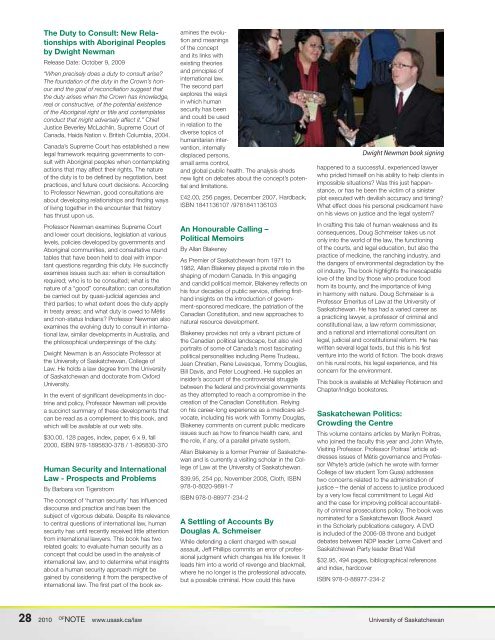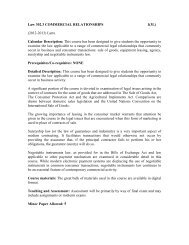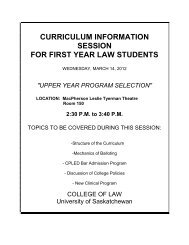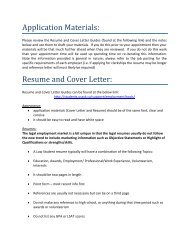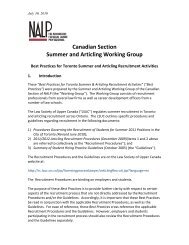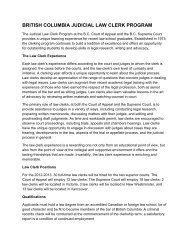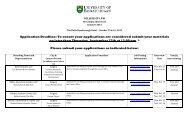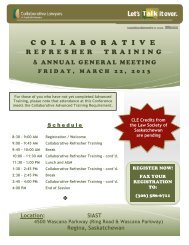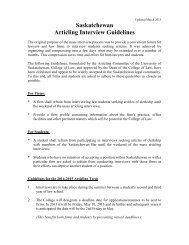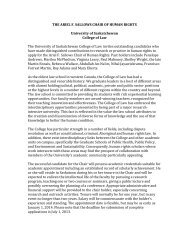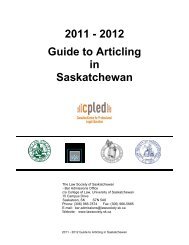2010 of NOTE - College of Law - University of Saskatchewan
2010 of NOTE - College of Law - University of Saskatchewan
2010 of NOTE - College of Law - University of Saskatchewan
You also want an ePaper? Increase the reach of your titles
YUMPU automatically turns print PDFs into web optimized ePapers that Google loves.
The Duty to Consult: New Relationships<br />
with Aboriginal Peoples<br />
by Dwight Newman<br />
Release Date: October 9, 2009<br />
“When precisely does a duty to consult arise?<br />
The foundation <strong>of</strong> the duty in the Crown’s honour<br />
and the goal <strong>of</strong> reconciliation suggest that<br />
the duty arises when the Crown has knowledge,<br />
real or constructive, <strong>of</strong> the potential existence<br />
<strong>of</strong> the Aboriginal right or title and contemplates<br />
conduct that might adversely affect it.” Chief<br />
Justice Beverley McLachlin, Supreme Court <strong>of</strong><br />
Canada, Haida Nation v. British Columbia, 2004.<br />
Canada’s Supreme Court has established a new<br />
legal framework requiring governments to consult<br />
with Aboriginal peoples when contemplating<br />
actions that may affect their rights. The nature<br />
<strong>of</strong> the duty is to be defined by negotiation, best<br />
practices, and future court decisions. According<br />
to Pr<strong>of</strong>essor Newman, good consultations are<br />
about developing relationships and finding ways<br />
<strong>of</strong> living together in the encounter that history<br />
has thrust upon us.<br />
Pr<strong>of</strong>essor Newman examines Supreme Court<br />
and lower court decisions, legislation at various<br />
levels, policies developed by governments and<br />
Aboriginal communities, and consultative round<br />
tables that have been held to deal with important<br />
questions regarding this duty. He succinctly<br />
examines issues such as: when is consultation<br />
required; who is to be consulted; what is the<br />
nature <strong>of</strong> a “good” consultation; can consultation<br />
be carried out by quasi-judicial agencies and<br />
third parties; to what extent does the duty apply<br />
in treaty areas; and what duty is owed to Métis<br />
and non-status Indians? Pr<strong>of</strong>essor Newman also<br />
examines the evolving duty to consult in international<br />
law, similar developments in Australia, and<br />
the philosophical underpinnings <strong>of</strong> the duty.<br />
Dwight Newman is an Associate Pr<strong>of</strong>essor at<br />
the <strong>University</strong> <strong>of</strong> <strong>Saskatchewan</strong>, <strong>College</strong> <strong>of</strong><br />
<strong>Law</strong>. He holds a law degree from the <strong>University</strong><br />
<strong>of</strong> <strong>Saskatchewan</strong> and doctorate from Oxford<br />
<strong>University</strong>.<br />
In the event <strong>of</strong> significant developments in doctrine<br />
and policy, Pr<strong>of</strong>essor Newman will provide<br />
a succinct summary <strong>of</strong> these developments that<br />
can be read as a complement to this book, and<br />
which will be available at our web site.<br />
$30.00, 128 pages, index, paper, 6 x 9, fall<br />
2000, ISBN 978-1895830-378 / 1-895830-370<br />
Human Security and International<br />
<strong>Law</strong> - Prospects and Problems<br />
By Barbara von Tigerstrom<br />
The concept <strong>of</strong> ‘human security’ has influenced<br />
discourse and practice and has been the<br />
subject <strong>of</strong> vigorous debate. Despite its relevance<br />
to central questions <strong>of</strong> international law, human<br />
security has until recently received little attention<br />
from international lawyers. This book has two<br />
related goals: to evaluate human security as a<br />
concept that could be used in the analysis <strong>of</strong><br />
international law, and to determine what insights<br />
about a human security approach might be<br />
gained by considering it from the perspective <strong>of</strong><br />
international law. The first part <strong>of</strong> the book ex-<br />
amines the evolution<br />
and meanings<br />
<strong>of</strong> the concept<br />
and its links with<br />
existing theories<br />
and principles <strong>of</strong><br />
international law.<br />
The second part<br />
explores the ways<br />
in which human<br />
security has been<br />
and could be used<br />
in relation to the<br />
diverse topics <strong>of</strong><br />
humanitarian intervention,<br />
internally<br />
displaced persons,<br />
small arms control,<br />
and global public health. The analysis sheds<br />
new light on debates about the concept’s potential<br />
and limitations.<br />
£42.00, 256 pages, December 2007, Hardback,<br />
ISBN 1841136107 /9781841136103<br />
An Honourable Calling –<br />
Political Memoirs<br />
By Allan Blakeney<br />
As Premier <strong>of</strong> <strong>Saskatchewan</strong> from 1971 to<br />
1982, Allan Blakeney played a pivotal role in the<br />
shaping <strong>of</strong> modern Canada. In this engaging<br />
and candid political memoir, Blakeney reflects on<br />
his four decades <strong>of</strong> public service, <strong>of</strong>fering firsthand<br />
insights on the introduction <strong>of</strong> government-sponsored<br />
medicare, the patriation <strong>of</strong> the<br />
Canadian Constitution, and new approaches to<br />
natural resource development.<br />
Blakeney provides not only a vibrant picture <strong>of</strong><br />
the Canadian political landscape, but also vivid<br />
portraits <strong>of</strong> some <strong>of</strong> Canada’s most fascinating<br />
political personalities including Pierre Trudeau,<br />
Jean Chretien, Rene Levesque, Tommy Douglas,<br />
Bill Davis, and Peter Lougheed. He supplies an<br />
insider’s account <strong>of</strong> the controversial struggle<br />
between the federal and provincial governments<br />
as they attempted to reach a compromise in the<br />
creation <strong>of</strong> the Canadian Constitution. Relying<br />
on his career-long experience as a medicare advocate,<br />
including his work with Tommy Douglas,<br />
Blakeney comments on current public medicare<br />
issues such as how to finance health care, and<br />
the role, if any, <strong>of</strong> a parallel private system.<br />
Allan Blakeney is a former Premier <strong>of</strong> <strong>Saskatchewan</strong><br />
and is currently a visiting scholar in the <strong>College</strong><br />
<strong>of</strong> <strong>Law</strong> at the <strong>University</strong> <strong>of</strong> <strong>Saskatchewan</strong>.<br />
$39.95, 254 pp, November 2008, Cloth, ISBN<br />
978-0-8020-9891-7<br />
ISBN 978-0-88977-234-2<br />
A Settling <strong>of</strong> Accounts By<br />
Douglas A. Schmeiser<br />
While defending a client charged with sexual<br />
assault, Jeff Phillips commits an error <strong>of</strong> pr<strong>of</strong>essional<br />
judgment which changes his life forever. It<br />
leads him into a world <strong>of</strong> revenge and blackmail,<br />
where he no longer is the pr<strong>of</strong>essional advocate,<br />
but a possible criminal. How could this have<br />
Dwight Newman book signing<br />
happened to a successful, experienced lawyer<br />
who prided himself on his ability to help clients in<br />
impossible situations? Was this just happenstance,<br />
or has he been the victim <strong>of</strong> a sinister<br />
plot executed with devilish accuracy and timing?<br />
What effect does his personal predicament have<br />
on his views on justice and the legal system?<br />
In crafting this tale <strong>of</strong> human weakness and its<br />
consequences, Doug Schmeiser takes us not<br />
only into the world <strong>of</strong> the law, the functioning<br />
<strong>of</strong> the courts, and legal education, but also the<br />
practice <strong>of</strong> medicine, the ranching industry, and<br />
the dangers <strong>of</strong> environmental degradation by the<br />
oil industry. The book highlights the inescapable<br />
love <strong>of</strong> the land by those who produce food<br />
from its bounty, and the importance <strong>of</strong> living<br />
in harmony with nature. Doug Schmeiser is a<br />
Pr<strong>of</strong>essor Emeritus <strong>of</strong> <strong>Law</strong> at the <strong>University</strong> <strong>of</strong><br />
<strong>Saskatchewan</strong>. He has had a varied career as<br />
a practicing lawyer, a pr<strong>of</strong>essor <strong>of</strong> criminal and<br />
constitutional law, a law reform commissioner,<br />
and a national and international consultant on<br />
legal, judicial and constitutional reform. He has<br />
written several legal texts, but this is his first<br />
venture into the world <strong>of</strong> fiction. The book draws<br />
on his rural roots, his legal experience, and his<br />
concern for the environment.<br />
This book is available at McNalley Robinson and<br />
Chapter/Indigo bookstores.<br />
<strong>Saskatchewan</strong> Politics:<br />
Crowding the Centre<br />
This volume contains articles by Marilyn Poitras,<br />
who joined the faculty this year and John Whyte,<br />
Visiting Pr<strong>of</strong>essor. Pr<strong>of</strong>essor Poitras’ article addresses<br />
issues <strong>of</strong> Métis governance and Pr<strong>of</strong>essor<br />
Whyte’s article (which he wrote with former<br />
<strong>College</strong> <strong>of</strong> law student Tom Gusa) addresses<br />
two concerns related to the administration <strong>of</strong><br />
justice – the denial <strong>of</strong> access to justice produced<br />
by a very low fiscal commitment to Legal Aid<br />
and the case for improving political accountability<br />
<strong>of</strong> criminal prosecutions policy. The book was<br />
nominated for a <strong>Saskatchewan</strong> Book Award<br />
in the Scholarly publications category. A DVD<br />
is included <strong>of</strong> the 2006-08 throne and budget<br />
debates between NDP leader Lorne Calvert and<br />
<strong>Saskatchewan</strong> Party leader Brad Wall<br />
$32.95, 494 pages, bibliographical references<br />
and index, hardcover<br />
ISBN 978-0-88977-234-2<br />
Lectureships<br />
Each year, thanks to the generosity <strong>of</strong> donors, the <strong>College</strong> is able to invite<br />
renowned legal scholars and outstanding practioners to share their ideas on law<br />
and society, enriching the intellectual life <strong>of</strong> the college and the wider community.<br />
28 <strong>2010</strong> <strong>of</strong>Note www.usask.ca/law <strong>University</strong> <strong>of</strong> <strong>Saskatchewan</strong> <strong>College</strong> <strong>of</strong> <strong>Law</strong> Alumni Magazine www.usask.ca/law <strong>of</strong> <strong>College</strong> <strong>of</strong> <strong>Law</strong> Alumni Magazine www.usask.ca/law Note <strong>2010</strong> 29<br />
<strong>of</strong>Note <strong>2010</strong> 29


